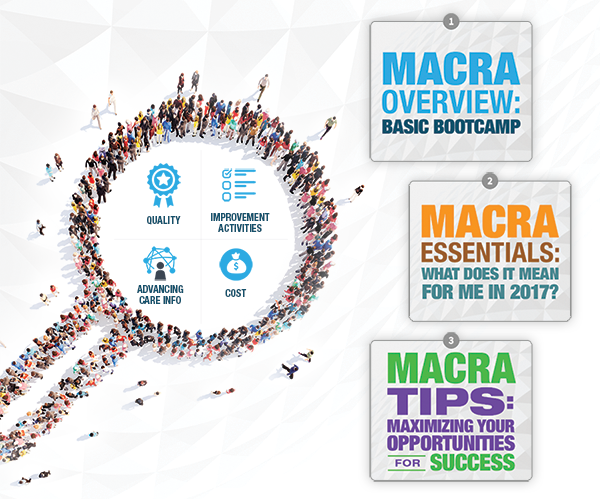Despite the change in administration, experts say The Medicare Access and CHIP Reauthorization Act (MACRA) is here to stay and it’s full speed ahead. The MACRA law replaces the previous fee-for-service Medicare payment structure with a value-based pay-for-performance program built on measures of quality and efficiency. The legislation affects all healthcare providers that care for at least 100 Medicare patients or bill more than $30,000 a year. The shift from volume to value-based payment will either reward or penalize providers based upon their performance.
Although the program has now been underway since January 2017, a recent survey indicates that more than half of healthcare providers (64%) still feel they are unprepared to meet the new requirements of the law. (1) The positive news is that providers have the ability to pick their pace, which allows for some flexibility, transitional time, and helps practices avoid penalties.
Below are some key points practices should consider for MACRA success:
- Pick your team- All healthcare systems and medical groups should identify a team of key leaders to head the MACRA transition.
- Register with CMS– The deadline for groups to register with CMS is no later than June 30, 2017.
- Educate Staff– Meaningful and ongoing education is necessary for all staff members. MACRA training should be tailored toward each department to address varying concerns. Education tools may also be helpful such as e-learning courses. Making education convenient and accessible is key to adoption. (3)
- Report data- The Centers for Medicaid and Medicare Services (CMS) requires eligible clinicians to report on three performance categories for a consecutive 90-day period. Although, it is important to track data the entire year, it is only necessary to submit data for a 90-day period in order to receive a potential positive adjustment. Providers may also report just one measure to prevent the penalty. Doing nothing at all, will result in a 4% reduction in 2019 payments. (2)
- Review current data and reporting methods– MACRA requires careful tracking and reporting. Identify current vendors and consolidate reporting methods. CMS encourages organizations to streamline their vendors to reduce the administrative burden. Only one submission mechanism for each performance category is permitted. (2)
- Make Patient Experience the Core Focus– Patients outcomes and experience should remain the core focus.
Ultimately, MACRA success is a collective team effort within a practice or organization. Management should build a team and work with clinicians to select right measures that work best for their practice. Always keeping patients front and center of the implementation is key to success.
References:
- http://www.stoltenberg.com/documents/surveys/2017HITOutlookSurvey.pdf
- https://www.studergroup.com/resources/articles-and-industry-updates/insights/february-2017/five-tips-to-jumpstart-your-macra-strategy
- http://www.beckershospitalreview.com/finance/the-macra-marathon-3-keys-on-training-for-success.html



